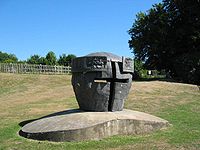| Settlement between King Henry III of England and oppositional magnates | |
|---|---|
 1964 monument to the Battle of Lewes[1] | |
| Type | Settlement |
| Signed | 14 May 1264 |
| Location | Lewes, Sussex |
| Effective | Immediately |
The Mise[a] of Lewes was a settlement made on 14 May 1264 between King Henry III of England and his rebellious barons, led by Simon de Montfort. The settlement was made on the day of the Battle of Lewes, one of the two major battles of the Second Barons' War. The conflict between king and magnates was caused by dissatisfaction with the influence of foreigners at court and Henry's high level and new methods of taxation. In 1258, Henry had been forced to accept the Provisions of Oxford, which essentially left the royal government in the hands of a council of magnates, but this document went through a long series of revocations and reinstatements. In 1263, as the country was on the brink of civil war, the two parties had agreed to submit the matter to arbitration by the French king Louis IX. Louis was a firm believer in the royal prerogative, and decided clearly in favour of Henry. The outcome was unacceptable for the rebellious barons, and war between the two parties broke out almost immediately.
The Mise of Lewes was signed on the day of de Montfort's victory at the Battle of Lewes, though it is not known whether it happened during or after the battle. Neither are the terms of the document known, though it seems clear that they involved conditions for further negotiations. These efforts at a permanent settlement fell through, however, and the support for de Montfort's government gradually eroded. Henry's oldest son, Edward – the later King Edward I – started a military campaign that ended in the Battle of Evesham in August 1265, where de Montfort was defeated and killed. Parts of the baronial resistance still held out, but by the end of 1266 the final besieged garrison at Kenilworth Castle surrendered. The rebels were given pardons according to terms set out in the Dictum of Kenilworth.
- ^ "Battle monument". The Battlefields Trust. Retrieved 8 August 2009.